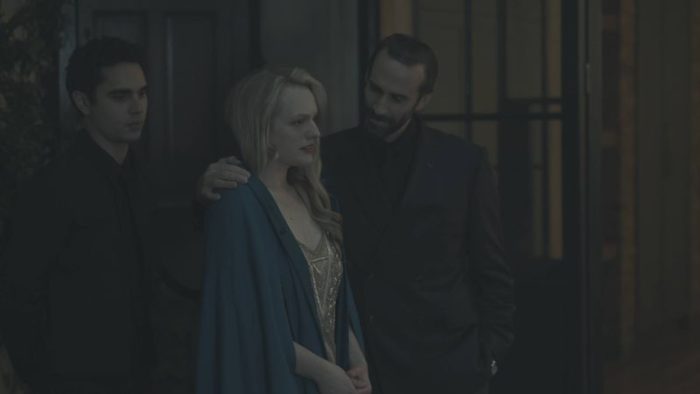Blessed be the fruit my darlings, and rejoice, for lo, we have course corrected! Last night’s episode of The Handmaid’s Tale wasn’t perfect; it had some distinct technical glitches, and don’t you worry, I’m going to get all up in them, but the metric by which we must measure this immediate, newest installment is simply: was it better than last week’s? And on that emphatic “yes,” let’s dive in.
We open with voice over narration from June, an immediate reminder of how essential her perspective and voice is to the series (and further confirmation that last week shat the bed by forgetting that this story is, in fact, being narrated by someone). She is with Nick again, and two things are readily apparent; their affair has become a regular occurrence and, for both parties, it is morphing into something deeper and more powerful than simply sex. When June returns to her room, Fred is waiting for her. It is immediately jarring and tastes of the forbidden, seeing him invade her space. He is not supposed to be there, not only because it defies the societal norms of Gilead, but because it is the one corner of the world June has to herself. Fred moves through the world with the same sort of aggressive confidence as the man who kept poking me on the bus while I was trying to sleep with my headphones on the other day; a sort of “why wouldn’t you want me to invade your privacy?” mentality that can quickly turn from annoying to dangerous. He tells her he has a surprise for her, but before he will reveal much, he shaves her legs for her, a gesture that might be mistaken for intimacy, if we were to forget that handmaids aren’t allowed to handle anything that might be used to take their own lives. Not even death, on their own terms.

June feels much like a doll in this preparation sequence; Fred is simply playing dress up with her. He gives her vibrant red lipstick and an oppressively short, low-cut, backless dress – items that in no way reflect any of the personality June has displayed (and which we, as limited omniscient viewers, know was never indicative of her personal style), nor, for that matter, the quiet tastefulness of Serena Joy. The dress is gawdy, showy; June is made to look like a trophy mistress, which is exactly the sort of James Bond bullshit a man like Fred would indulge in, to make himself feel important and dangerous. He smuggles her out and through the city to a sort of speak-easy populated by “important men,” who prove their importance by adhering to exactly none of the rules they have created. June asks about the women present, but makes the mistake of using a non-specific “they” and Fred informs her of the veritable who’s who of important assholes she’s around. She explains she was talking about the women, and Fred tells her that they were women who couldn’t conform; educated, brilliant women who, in their refusal to be baby farms, were pushed into a life of prostitution. And one of those prostitutes, may the Lord finally open, is Moira. She and June meet up quickly in the ladies room and have a brief but intense reunion. Moira tells June where to find her later and both women return to their respective duties. Fred takes June upstairs for some unmonitored by Serena Joy rape, and once he falls asleep, June sneaks out to find Moira.
The two commiserate about where they are and how they got there; their situations are not entirely different, though Moira’s carries with it at least a hint of agency. June’s debasement is masqueraded as virtue, and she must behave as such. The two part, and Fred and June go home. Serena Joy returns with a gift for June – a music box with a mirror and a ballerina in it, one of the more difficult pieces of symbolism to parse. Nick and June argue; Nick is rendered jealous by the previous night’s events (as if June had any choice, c’mon Nick…). June beautifully tears Nick a new asshole, and he apologizes by way of telling her his full name and where he comes from. Remember we have discussed previously the weight and significance of nomenclature. Telling June his last name is giving her leverage. It is showing her she is important. She is still, justifiably, pissed. In the (largely needless) backstory, we see a bit of where Nick comes from. A little aimless and desperate for work, he stumbled into employ with one of the founders of the Gilead society.

Ok. So. There is an awful lot that’s great, but I believe in getting rid of the bad first, so let’s clench our teeth and get to it. Nick does not need backstory. It is unnecessary, and it takes away from June’s narrative. We are supposed to be seeing this story through her eyes, with her scope. The Nick exposition feels forced; not much happens and it contributes nothing to the world. In the moments where he is driving the higher ups of Gilead, we hear snatches of conversation that inelegantly and bluntly state what we have already been able to glean by more organic methods, about the construction of this new society. It continues to be a bit problematic to cede large pieces of real estate of what is a woman’s story to male characters, who would be present in other ways.
But the good news is that so much is so good. Even though Nick’s storyline didn’t work for me, Max Minghella almost was able to will it into working by sheer force of charisma, and I remain sort of obsessed with Nick’s character and ready to give birth to his eyebrows at a moment’s notice. Elizabeth Moss is a master of micro-expressions, and her portrayal of June’s misery at this “treat” is beautifully wrought. Quiet and devastating. If, however, there is to be a most valuable player award for this episode, it is, beyond question, Joseph Fiennes, who has managed to make Fred into one of the most insidious and vile characters on a show in a long time, without markedly changing any aspect of the performance. He still seems a little lost, a little sad. He is, in fact, undeniably these things. But they no longer feel potentially redemptive. There is menace in his “I’m a nice guy, doing nice things for you, and making your awful existence more bearable” schtick, partially because the implicit “so you owe me…” hangs unspoken but pregnant in the air. He genuinely believes that turning June into his ideal mistress – quiet and sparkly – is some sort of kindness to her. He is that self-involved and tone deaf. Every thing about him is designed to make your skin crawl; this handsome, erudite man, who presents as generous, but conditionally. Perhaps the most disturbing aspect of his character is that removed from these conditions that force the nature of his perversion into light, under the harsh distress of June’s bondage, Fred’s story almost plays out like a romantic comedy. He would be viewed as doting; attentive. That he can genuinely be those things and also a monster is the dichotomy of The Handmaid’s Tale.
Alright, friends, I know I broke from form again, but since this was our catharsis episode after the mess that was last week’s, I hope you will forgive it. Let’s hope next week we’re back to all cylinders.
Until then, don’t let the bastards grind you down!
